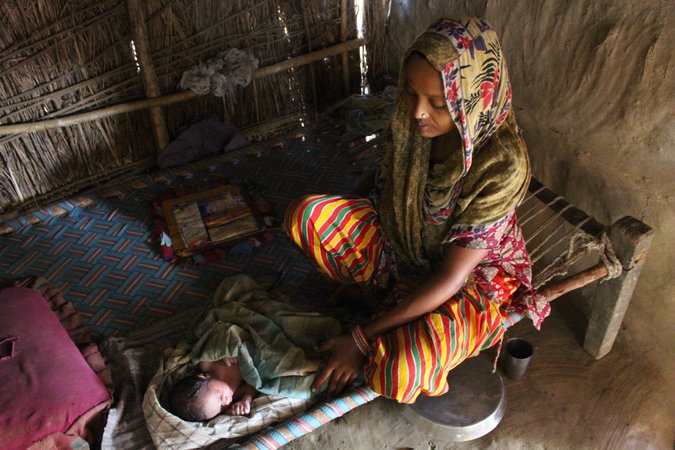LUCKNOW, India — What if there were a remedy that could save more children’s lives in the developing world than are claimed by Malaria and AIDS combined?
A miracle substance that reduces ear infections while seeming to raise scores on I.Q. tests by several points? Available even in the most remote villages, requiring no electricity or refrigeration? Oh, and as long as we’re dreaming, let’s make it free!
This miracle substance already exists. It’s Breastmilk.
Current estimates backed by the World Health Organization and Unicef are that optimal Breastfeeding would save 800,000 children’s lives a year in developing countries. That would amount to a 12 percent drop in child mortality, a huge gain.
Human rights, women’s rights, health, global affairs.
I’m on my annual win-a-trip journey, in which I take a student with me to the developing world to look at neglected issues. The student, Austin Meyer of Stanford University, and I have been reporting in India, where 1.2 million children under the age of 5 die annually — and where nutritionists say that improved breast-feeding practices could save many.
Exclusive Breastfeeding for six-months, as strongly recommended by the World Health Organization, is practiced by just 46 percent of women in India, 17 percent in Nigeria, and 10 percent in Yemen, according to the latest Global Nutrition Report. (In the U.S., the figure is about 22 percent, according to the Centers for Disease Control and Prevention.)
Let me get this out of the way: It’s awkward for men to hail Breastfeeding, and it risks sounding patronizing because we’re not the ones doing the work.
And this: Sometimes promotion of Breastfeeding carries an unfortunate edge of reproach for women who can’t breast-feed or choose not to, and that’s counterproductive. In America, there’s tension about these issues; an essay in The Times on Sunday warned that promotion efforts can degenerate into shaming women. That’s a fair caution.
In any case, where this is a life-or-death issue is not the West but in developing countries, where water is often contaminated and child mortality is high.
Infants who are not breastfed are 14 times more likely to die than those who are exclusively breastfed, according to a major meta-study just published by Acta Paediatrica, a Pediatrics Journal.
Here in northern India, Austin and I met a mother, Maher Bano, whose daughter had been born at home just hours earlier. The baby was underweight and in danger of dying. The best medicine in this context is breast milk: Studies from India, Nepal and Ghana show that prompt breastfeeding reduces neonatal mortality by 44 percent.
But Maher Bano said that for the first 24 hours, the baby would be given only tea with honey.
“I’ll breastfeed the baby tomorrow, or the next day,” she said, explaining that she was following the guidance of the traditional birth attendant who had helped her deliver the baby and cut the cord.
This is common: Worldwide, only 43 percent of babies are put to the breast within an hour of birth, as recommended by the World Health Organization.
One reason for delays is suspicion of colostrum, the first, yellowish milk, which doesn’t look quite like milk but is packed with nutrients and antibodies; it’s sometimes called the “first immunization.”
Another big challenge: In hot countries, villagers also often give infants water on hot days, or start them on food before six-months. Water both displaces milk and also is often contaminated. (Breastmilk, in contrast, is safe even when the mom drinks contaminated water.)
Western companies are also to blame. Manufacturers of infant formula face stagnant growth in Western countries, so they aggressively pursue poorer countries. Researchers found that 85 percent of recently discharged Mothers in Phnom Penh, Cambodia, had seen advertising for formula.
Some also believe that Western entertainment has sexualized the breast in ways that reduce breast-feeding.
While the clearest benefits of Breastfeeding have to do with saving lives, there is also some evidence of other health and cognitive gains. In Belarus, children of women randomly assigned to exclusive breast-feeding promotion scored six points higher on I.Q. tests than controls.
A few studies haven’t found a tie to cognitive capacity, but most have. Over all, a new review of 17 studies found a mean gain of three I.Q. points for children who were breastfed.
Global Health Experts focus on breastfeeding partly because efforts to support Moms in this area pay off surprisingly well. A recent survey by Acta Paediatrica of 130 estimates found that breastfeeding promotion on average increased exclusive breastfeeding by an astonishing 44 percent.
This annual win-a-trip journey is a chance to highlight elegant solutions to global problems. Sometimes the solutions are dazzlingly high-tech, but almost nothing could save as many children’s lives each year as Nature’s Own Miracle: Breastmilk.
Nicholas Kristof OCT. 22, 2015


